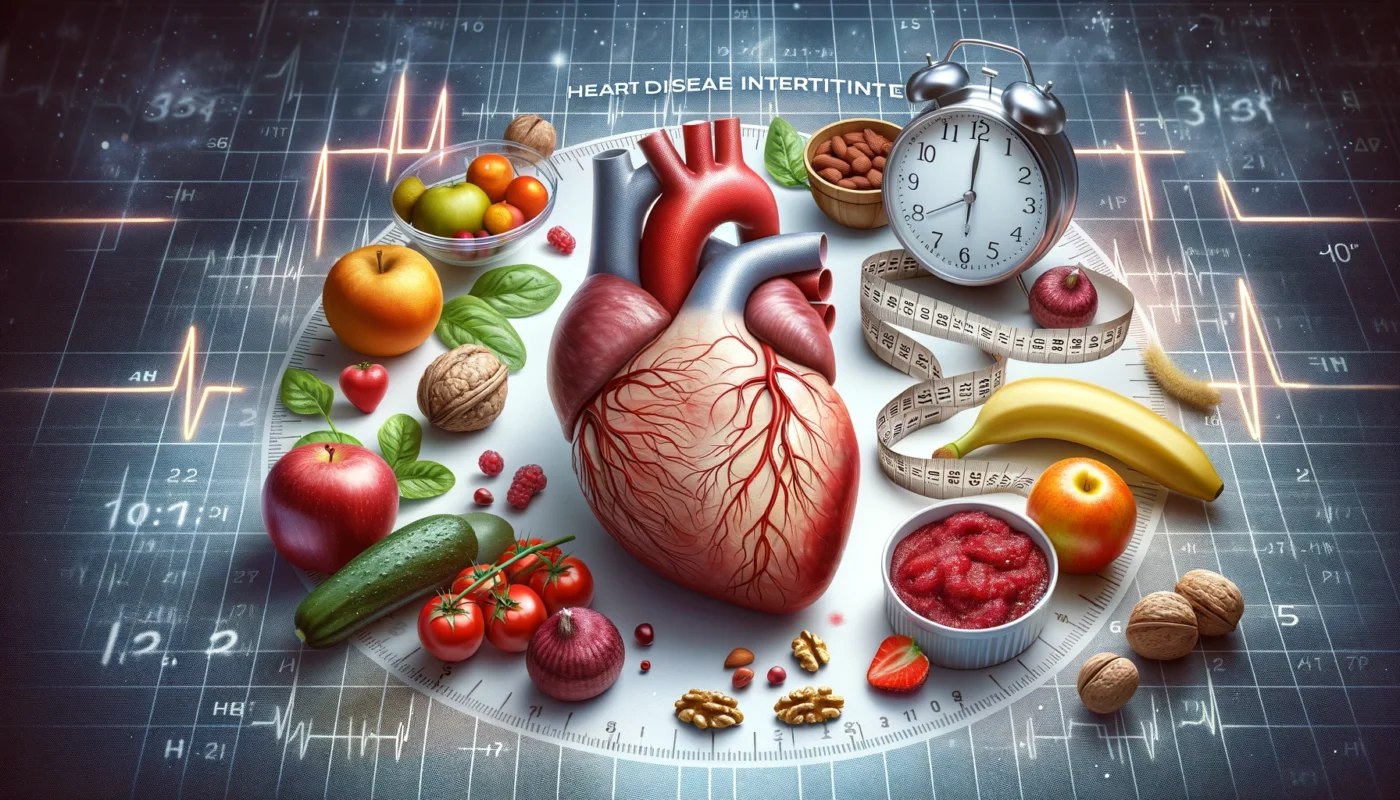Heart Disease and Intermittent Fasting
Heart disease has become a significant health issue that affects millions of people across the globe. This condition is caused when blood vessels are narrowed or blocked, resulting in decreased blood flow towards the heart. It can result in chest discomfort, breathlessness as well as other signs, which can lead to having a heart attack. Although numerous elements cause heart disease, such as the genetics of heart disease and the lifestyle Recent research suggests that intermittent fasting might provide a viable option in reducing the chance of heart diseases.

Intermittent fasting is a diet strategy that involves switching between intervals of fasting and eating. Many are using it to lose weight and improve general well-being. The most popular methods include the 16/8 approach, which involves fasting for 16 hours and then eating within an 8-hour time frame, or the 5:2 strategy, which involves consuming a normal diet for five days and limiting calories to 500-600 during two days.
Heart disease and intermittent fasting have become focal points in the quest for better cardiovascular health. The relationship between heart disease and intermittent fasting has shown promising results, highlighting its potential benefits for heart health.
- Heart disease is a major illness that affects millions of people around the world.
- Intermittent fasting can be described as a dietary strategy that involves switching intervals of fasting and eating.
- Research suggests intermittent fasting could be beneficial in decreasing the risk of developing heart illness.
Understanding Heart Disease and Intermittent Fasting

Heart Disease
Definition and Types
Heart disease, or cardiovascular disease, refers to ailments that affect the heart and blood vessels. It’s among the most prevalent causes of death in the world. There are a variety of heart diseases. These include:
- Coronary artery disease is when plaque accumulation reduces blood flow to the heart.
- Arrhythmia is an irregular heart rhythm that can trigger heartbeats to become too quickly, too slowly, or even irregularly.
- Heart valve disease is when the valves inside the heart don’t function properly, allowing blood to flow incorrectly or in a non-existent way.
- Heart failure: A disease in which the heart cannot supply suitable blood to satisfy the body’s requirements.
Risk Factors and Causes
There are a variety of risk factors that could improve an individual’s chance of suffering from a heart condition. The most well-known risk factors are:
- The risk of heart disease increases as we age.
- Family history: Having the bloodline of a relative with heart disease may improve a person’s risk.
- Smoking causes damage to blood vessels and raises the risk of suffering from heart disease.
- High blood pressure: High blood pressure may damage blood vessels and improve the likelihood of suffering from heart disease.
- A high cholesterol concentration could cause plaque formation in the arterial walls, which increases the likelihood of developing heart disease.
- Diabetes can cause damage to the blood vessels, and boost the likelihood of suffering from heart diseases.
Other causes that may be contributing to the development of heart disease are a restless lifestyle, poor nutrition as well as stress, and weight gain.
To conclude, knowing the nature, definitions, and risk factors contributing to heart disease is crucial to preventing and managing it. Living a healthy, balanced life that includes regular exercise, a healthy diet, and not smoking can lower the chance of suffering from heart disease.
Basics of Intermittent Fasting

Intermittent fasting refers to an eating pattern that alternates between meals and fasting. It’s gained enough attention recently due to its potential health benefits, including reducing the risk of heart disease. With proper guidance and monitoring, the benefits of heart disease and intermittent fasting can be maximized, offering improved cardiovascular health outcomes.
Fasting Protocols
There are a variety of protocols to intermittently fast, such as:
- 16/8 method It involves fasting at least 16 hours a day and eating every meal within 8 hours.
- 5:2 method Method: This is a way of eating as normal five days a week. It also limits the intake of calories to 500-600 calories over two consecutive days.
- Alternate-Day Fasting It involves switching between eating days that are not restricted and those that consume 500 to 600 calories.
Mechanisms of Action
Intermittent fasting is known to possess numerous mechanisms of operation that could lead to the health benefits it offers, which include:
- Autophagy is a method by which damaged cells are destroyed and reused. Intermittent fasting improves autophagy and prevents plaque accumulation within the blood vessels.
- Reduction of inflammation: Intermittent fasting has been proven to decrease inflammation. It can be a risk factor for heart disease.
- Enhanced insulin sensitivity Intermittent fasting is proven to raise insulin sensitivity, which could lower the chance of developing type 2 diabetes, an underlying high-risk factor for heart disease.
In the end, intermittent fasting has shown the potential of a diet that could decrease the chance of developing heart disease. Yet, more study is required to understand the mechanisms behind its effect and potential benefits.
Heart disease Intermittent Fasting

Intermittent fasting is a healthy diet that involves switching between eating and fasting. It’s gained much attention over the last few years as a way to lose weight and increase general health. However, researchers have been particularly interested in its impact on heart health. Individuals considering heart disease and intermittent fasting should consult healthcare professionals. The theory of intermittent fasting is that limiting the amount of time you eat can benefit the body by burning off fat and boosting the efficiency of your metabolism.
Lifestyle and Behavioral Factors
Exercise and Physical Activity
Regular physical and mental exercise is essential to a healthy lifestyle and could lower the chance of heart disease. The exercise routine is a great way to boost the health of your cardiovascular system by building the muscles of your heart, lowering blood pressure, and improving blood circulation.
The American Heart Association recommends that adults exercise at least 150 minutes of moderate-intensity aerobic exercise and 75 minutes of vigorous-intensity aerobic activity weekly. Strengthening and flexibility exercises can also be helpful. Moreover, improved blood pressure regulation links heart disease and intermittent fasting. By promoting weight loss and reducing insulin resistance, intermittent fasting can significantly lower the risk of heart disease.
Stress Management and Sleep
Lack of sleep and stress may contribute to the onset of heart disease. Chronic stress’s effects include hypertension and inflammation, as well as other factors that improve the risk of heart disease. Sleeping well is crucial to heart health, as lack of sleep may increase the likelihood of hypertension, obesity, and diabetes.
Strategies for stress management, such as deep breathing, meditation, and yoga, can lower stress levels. Getting suitable sleep each night is also a great way to decrease stress and increase general well-being. The National Sleep Foundation recommends that adults get at least 7 to 9 hours of rest each night.
In the end, regular exercise, stress reduction methods, and adequate sleeping in one’s daily routine could decrease the likelihood of suffering from heart health.
Dietary Considerations

Nutritional Guidelines
Regarding heart disease and intermittent fasting, it’s important to pay attention to the nutritional content of the foods consumed during eating periods. A heart-healthy diet should include plenty of fruits, vegetables, whole grains, lean proteins, and healthy fats. It’s also important to limit the intake of processed foods, saturated and trans fats, sodium, and added sugars.
It’s important to stay hydrated and consume enough electrolytes during fasting periods. This can be achieved through drinking water and consuming foods such as bone broth, which is rich in minerals and electrolytes.
Combining Diet with Fasting
Combining a heart-healthy diet with intermittent fasting can be an effective way to manage heart disease. However, working with a healthcare professional to determine the best approach for individual needs is important.
One approach may be to follow a modified fasting schedule, such as time-restricted eating, where the eating window is limited to a certain number of hours each day. Another approach may be to incorporate occasional longer fasts, under the guidance of a healthcare professional.
Potential Risks and Challenges of Heart Disease and Intermittent Fasting
Contraindications
talking about Heart Disease and Intermittent Fasting, Intermittent fasting (IF) is not appropriate for everyone, especially those who suffer from certain ailments. Individuals with a history of eating problems, nursing or pregnant women, as well as those suffering from diabetes, blood sugar levels that are low or any other metabolic disorder must stay clear of IF or seek the advice of a medical competent before starting. IF is also not suitable for those who have a history of heart disease because it may cause fluctuation in blood pressure, and improve the chance of suffering a stroke or heart attack.
Intermittent fasting has recently gained traction as a way to combat and prevent heart disease. However, to avoid negative health risks, this strategy must be practiced with caution.
Monitoring Health Parameters
When beginning intermittent fasting, it is vital to check some health-related parameters to ensure it’s safe to begin the process. The parameters to be monitored comprise blood pressure, blood sugar, and cholesterol levels. Fasting may cause changes in these variables, which may be risky for people with preexisting heart problems. Studies on heart disease and intermittent fasting revealed that this dietary approach can lower LDL (bad) cholesterol and increase HDL (good) cholesterol, which is crucial for heart health.
Speaking with a health professional before beginning intermittent fasting is advised to ensure it is safe for your medical needs. Furthermore, it is recommended that you monitor your health conditions throughout your fast to ensure that you are having no adverse reactions.
Consulting Healthcare Professionals
However, individuals considering heart disease and intermittent fasting should consult healthcare professionals. Fasting may cause changes in blood pressure and sugar levels. These could be harmful to those suffering from heart disease.
Additionally, those taking heart-related medications must consult their medical specialist before beginning an intermittent fast. Fasting could affect how medications are absorbed and processed by the body, which is a risk for people with heart disease.
To conclude, safe intermittent fasting is essential for those with heart disease. Monitoring health indicators and consultation with health professionals will ensure that the intermittent fasting process is both safe and beneficial for treating heart problems.
Conclusion
At the end of the discussion regarding Heart Disease and Intermittent Fasting, intermittent fasting could benefit people suffering from heart disease. Research has shown it could boost blood cholesterol levels, pressure, and insulin sensitivity. However, further research is required to comprehend the long-term impacts of this type of diet on heart health.
It is crucial to remember that fasting isn’t appropriate for everyone, particularly those suffering from certain medical conditions and those who are pregnant or lactating. You should speak with an expert in your healthcare before commencing an intermittent fasting routine.
Integrating healthy eating habits and regular physical exercise into your lifestyle remains the best method to avoid heart disease. Intermittent fasting may be utilized as an addition to a healthy lifestyle; however, it should not be regarded as the only method to improve heart health. Research also indicates that heart disease and intermittent fasting are linked to reduced inflammation and oxidative stress.
In general, intermittent fasting has proven to have a positive payoff for improving health parameters, but further studies are needed to determine the effects. Before beginning any new exercise or diet program regarding heart disease and Intermittent Fasting, people must talk with their healthcare physician to warrant its safety and appropriateness for their specific requirements.
Frequently Asked Questions
Does heart disease and Intermittent Fasting correlate?
Fasting intermittently can cause the heart to beat faster in certain people, particularly when drinking insufficient fluids or excess caffeine. This is not an uncommon side effect, usually managed through hydration and restriction of caffeine consumption.
Does intermittent fasting make sense for those with cardiovascular conditions?
It is crucial for people who have heart problems to talk with their health physician before starting an intermittent fasting routine. Based on the severity of the issue the intermittent fasting regimen may not be advised or require modification to warrant security.
What effects does intermittent fasting have on the overall health of your heart?
Intermittent fasting has been proven beneficial to the heart’s overall health, as it lowers blood pressure, decreases inflammation, and increases insulin sensitivity. However, further research is necessary to understand better the effects of long-term intermittent fasting on heart health.
What are the effects of intermittent fasting on levels of cholesterol?
Intermittent fasting could positively impact cholesterol levels by decreasing LDL (bad) cholesterol and raising HDL (good) cholesterol. However, the degree of these benefits may differ depending on the person and the specific interval fasting regimen.
Does intermittent fasting benefit the treatment of heart conditions?
Intermittent fasting could help prevent heart disease by improving overall heart condition and decreasing risk factors like hypertension and high cholesterol. However, it should not be considered a replacement for medical care or lifestyle adjustments your healthcare professional suggests.
Do you know of any particular interval fasting strategies that can help reduce cholesterol?
A few intermittent fasting regimens, including intermittent fasting or time-restricted eating, have been proven to reduce cholesterol. Yet, further study is required to determine the impact of these strategies on cholesterol levels and general heart health.
What is the connection between heart disease and intermittent fasting?
Intermittent fasting can improve heart health by reducing risk factors such as high blood pressure, cholesterol levels, and inflammation, potentially lowering the risk of heart disease.



